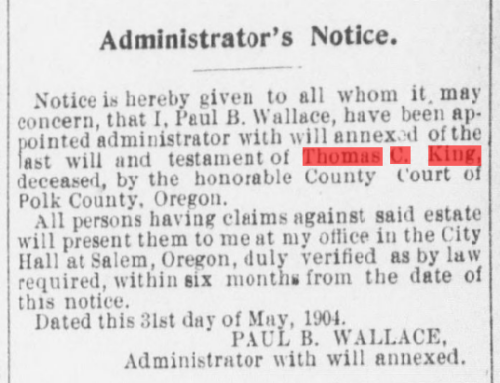by Richard van Pelt, WWI Correspondent
The front page of the Capital Journal assessed the first six months of the war, women on juries, and the first stretch of a road from Salem to Bend:
Six Months of War Tomorrow and No Sign of Peace Yet
By J.W.T. Mason
The sixth month of the war ends tomorrow, without apparent evidence of the peace negotiations which so many predicted last summer would be opened when half a year’s hostilities had been wages. Instead, both sides are preparing for a new conflict with new millions.
Only in Hungary is there any sign of dissatisfaction with the war. The Hungarian attitude is not due to exhaustion but to resentment because the Magyar interests were subordinated to German, in arranging the early strategy.
The fighting . . . has not caused the exhaustion of any of the combatants. Prophets who were certain human endurance could not stand more than a half year of modern war’s devastation underestimated man’s tenacity. The supposed enervating effects of civilization have had no influence on the war. The end of the conflict seemingly is as far way as when it began.
The probabilities of the conclusion of the war, based on the condition of the belligerents at present, are far different from what appeared likely in August. A decisive victory is now not to be looked for, nor will either Germany, Austria or the allies dominate Europe when peace comes.
German successes on land and English successes on the seas are the predominant, positive military results of the six months’ campaign. The Germans have carried the war far into the territories of their enemies and have fought themselves free from invasion except along narrow, unimportant strips in Alsace and East Prussia. They have shown military tenacity coupled with a probably unprecedentedly high average of intelligence among their commanding officers. Never before have system and scientific management been carried to as high a plane as by the Germans during the last half year.
England’s command of the seas has been fully as efficient as Germany’s land operations. There have been isolated instances of German naval successes, but all have been without military importance.
****
The second development of importance . . . has been the failure of the Russian offensive. The Slavs have gravely disappointed their western allies. Russian successes against Austria have removed some of the despondency in Petrograd over the German victories, but England and France have not found military satisfaction in them.
****
France’s position is in no sense satisfactory. The Germans have not been driven backward to any serious extent since they established themselves along the Aisne. On the contrary, several important gains along the south and west fronts have been made by the Germans. A succession of French generals failed to get to the Rhine through Alsace.
If the Germans ultimately are driven from France, the brunt of the work will fall on Lord Kitchener’s new army of a million men.
The six months’ fighting has been satisfactory only to Servia, whose rivalry of Austria was the immediate cause of the war.
BILL GIVING RIGHT TO SERVE ON JURY TO WOMEN KILLED
Senate Indefinitely Postpones Langguth Bill This Morning
STEAM ROLLER TREADS ON SEN. DIMICK’S TOES
Say He Likes Underhanded Methods But Is Too Pleased
ROAD FROM HERE TO BEND WELL UNDERWAY
Twenty Mile Stretch Between Salem and Stayton Will Be In By June 1
The growing concentration of wealth in the hands of a very few has dominated the news and it did so as well in 1915. The French economist Thomas Piketty has published a well received history of capital (Capital In The Twenty-First Century, Belkanp/Harvard, 2014) and he notes the inequality that existed in 1914:
What we see in the period 1870-1914 is at best a stabilization of inequality at an extremely high level, and in certain respects an endless inegalitarian spiral, marked in particular by increasing concentration of wealth. It is quite difficult to say where this trajectory would have led without the major economic and political shocks initiated by the war. With the aid of historical analysis and a little perspective, we can now see those shocks as the only forces since the Industrial Revolution powerful enough to reduce inequality. (Piketty, Page 8)
What was the good of industrial development, what was the good of all the technological innovations, toil, and population movements if, after half a century of industrial growth, the condition of the masses was still just as miserable as before, and all lawmakers could do was prohibit factory labor by children under the age of eight?
Piketty discusses Marx’s analysis:
[Marx’s] principal conclusion was what one might call the “principle of infinite accumulation,” that is, the inexorable tendency for capital to accumulate and become concentrated in ever fewer hands, with no natural limit to the process. This is the basis of Marx’s prediction of an apocalyptic end to capitalism: either the rate of return on capital would steadily diminish (thereby killing the engine of accumulation and leading to violent conflict among the capitalists), or capital’s share of national income would increase indefinitely (which sooner or later would unite the workers in revolt). In either case, no stable socioeconomic or political equilibrium was possible. (Piketty 9)An editorial in the Oregon Statesman, quoting extensively from Daniel Guggenheim, discusses the need for fair wages and working conditions as well as a safety net for workers and price all could pay if these needs are ignored:
RADICAL MILLIONAIRES
“Industry should be democratized. That is, the man who performs the labor should have a voice in the industry.
“Workmen must organize. The individual workman will get nowhere unless he does.
“State or federal care for those at a disadvantage in the present industrial development – that is the state’s job, to care for the people of the state. The taxpayers will have to pay, if necessary, for the state must raise the money to perform its function – its duty.
“Private charity is not effective. People want work, not charity. Men and women are not dogs or any other kind of animals. Their sensibilities must be considered. Charity pauperizes some people, while other who are sensitive starve.
“Industrial unrest is increasing. It is never too late to turn in the right direction. We are years behind Germany and England in social welfare – the care of the working population. If the voters had never done anything but force the compensation laws on the statute books, they would have justified their power. The theory of the ‘survival of the fittest’ is not for human society.
“Philanthropy has done something to alleviate conditions. If there had not been some mitigation, we would have had a revolution before this.
“The state – the government – should see to it that any man can get a job, or a bed in a hospital, or care in his old age – call it Socialism, if you wish. That’s elemental justice, not bounty. Workmen do not want merely advances in wages – that’s not all there is to the industrial discontent. They want comforts of life, and they want some of the luxuries.
“They’re entitled to them, and they are going to get them. The difference between the poor and the rich is too great.
“You hear talk about too much legislation. There has not begun to be enough legislation!”
If the editor of The Statesman had written the foregoing comments he would be accused of dangerous radicalism. He would probably be called a “rank Socialist” and a “menace to the community,” and his statements would be construed as a “malicious and unwarranted attack on vested interests.”
The editor hastens, therefore, to explain that the aforesaid dangerous and Socialistic statements are made by Daniel Guggenheim, president off the $115,000,000 American Smelting & Refining company, and of the Guggenheim Exploration company and many other gib mining interests, and a director of the Guaranty Trust company of New York. He made them voluntarily at a hearing of the federal commission on industrial relations.
If Mr. Guggenheim had talked that way five years ago his business associates would have wanted to lock him up in a sanitarium or string him up to a telegraph pole. Now plenty of them agree with him. It isa the conservative small business man and farmer and petty merchant and labor unionist who are amazed and scandalized.
We humbler folk have a hard time keeping up with our radical millionaires.







Leave A Comment